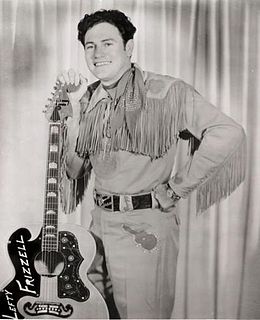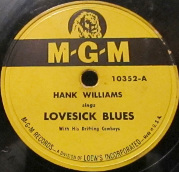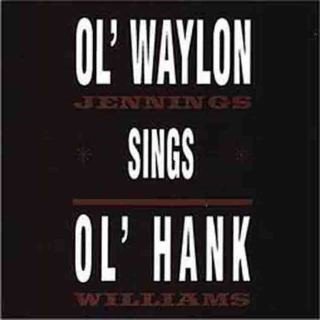
Clarence Eugene "Hank" Snow was a Canadian-American country music artist. Most popular in the 1950s, he had a career that spanned more than 50 years, he recorded 140 albums and charted more than 85 singles on the Billboard country charts from 1950 until 1980. His number-one hits include the self-penned songs "I'm Moving On", "The Golden Rocket" and "The Rhumba Boogie" and famous versions of "I Don't Hurt Anymore", "Let Me Go, Lover!", "I've Been Everywhere", "Hello Love", as well as other top 10 hits.

Hiram "Hank" Williams was an American singer, songwriter, and musician. Regarded as one of the most significant and influential American singers and songwriters of the 20th century, he recorded 35 singles that reached the top 10 of the Billboard Country & Western Best Sellers chart, including 11 that reached No. 1.

George Glenn Jones was an American musician, singer, and songwriter. He achieved international fame for his long list of hit records, including his best-known song "He Stopped Loving Her Today", as well as his distinctive voice and phrasing. For the last two decades of his life, Jones was frequently referred to as the greatest living country singer. Country music scholar Bill Malone writes, "For the two or three minutes consumed by a song, Jones immerses himself so completely in its lyrics, and in the mood it conveys, that the listener can scarcely avoid becoming similarly involved." Waylon Jennings expressed a similar opinion in his song "It's Alright": "If we all could sound like we wanted to, we'd all sound like George Jones." The shape of his nose and facial features earned Jones the nickname "The Possum".

William Orville "Lefty" Frizzell was an American country music singer-songwriter and honky-tonk singer.

Clyde Julian "Red" Foley was an American singer, musician, and radio and TV personality who made a major contribution to the growth of country music after World War II.
"Cold, Cold Heart" is a country music and pop song recorded by Hank Williams. This blues ballad is both a classic of honky-tonk and an entry in the Great American Songbook.

"Hey, Good Lookin'" is a 1951 song written and recorded by Hank Williams, and his version was inducted into the Grammy Hall of Fame in 2001. In 2003, CMT voted the Hank Williams version #19 on CMT's 100 Greatest Songs of Country Music. Since its original 1951 recording it has been covered by a variety of artists.
"I'm So Lonesome I Could Cry" is a song written and recorded by American country music singer-songwriter Hank Williams in 1949.

"Lovesick Blues" is a show tune written by Cliff Friend and Irving Mills. The song first appeared in the 1922 musical Oh, Ernest. It was first recorded by Elsie Clark and then by Jack Shea. Emmett Miller recorded it in 1925 and 1928, followed by country music singer Rex Griffin circa 1938. The recordings by Griffin and Miller inspired Hank Williams to perform the song during his first appearances on the Louisiana Hayride radio show in 1948. Receiving an enthusiastic reception from the audience, Williams decided to record his own version despite initial push back from his producer Fred Rose and his band.

Kickin' Out the Footlights...Again is a studio album by American country music artists George Jones and Merle Haggard, released in 2006.

"Kaw-Liga" is a country music song written by Hank Williams and Fred Rose.

Ol' Waylon Sings Ol' Hank is an album by the American country music artist Waylon Jennings, released on the singer's own label, WJ Records, in 1992.

Sings Country and Western Hits is the 1961 country music studio album released in May 1961 by George Jones. The album was Jones' tenth studio album release since his debut LP in 1956. It would be one of his last with Mercury Records, as he switched to United Artists in late 1961.

A Time to Sing is the ninth studio album by American country music singer and songwriter Hank Williams Jr. The album was issued by MGM Records as number SE 4540ST. The full title is: From The Motion Picture Sound Track Hank Williams Jr. Sings Songs From Metro-Goldwyn-Mayer's A Time To Sing. The song "Next Time I Say Goodbye I'm Leaving" is sung by Shelley Fabares.
"You Win Again" is a 1952 song by Hank Williams. In style, the song is a blues ballad and deals with the singer's despair with his partner. The song has been widely covered, including versions by Ray Charles, Jerry Lee Lewis, Roy Orbison, the Grateful Dead, Bob Dylan, and the Rolling Stones.
"Mind Your Own Business" is a 1949 song written and originally performed by Hank Williams.

Carvell Lee Ausborn, better known by his stage name, Mississippi Slim, was a hillbilly singer who had a radio show on Tupelo's WELO during the later 1940s and recorded for Tennessee Records. Ausborn also gained fame among Elvis Presley historians because he was one of the earliest musical influences of the young Presley and once let him sing on his radio show.
This is a list of notable events in country music that took place in 2017.












